Cat Burns on coming out, falling in love and setting the charts alight
From busking on the South Bank to supporting Ed Sheeran and creating slow-burn smash ‘Go’, Cat Burns was the obvious choice for the Attitude Music Award, supported by Jaguar.
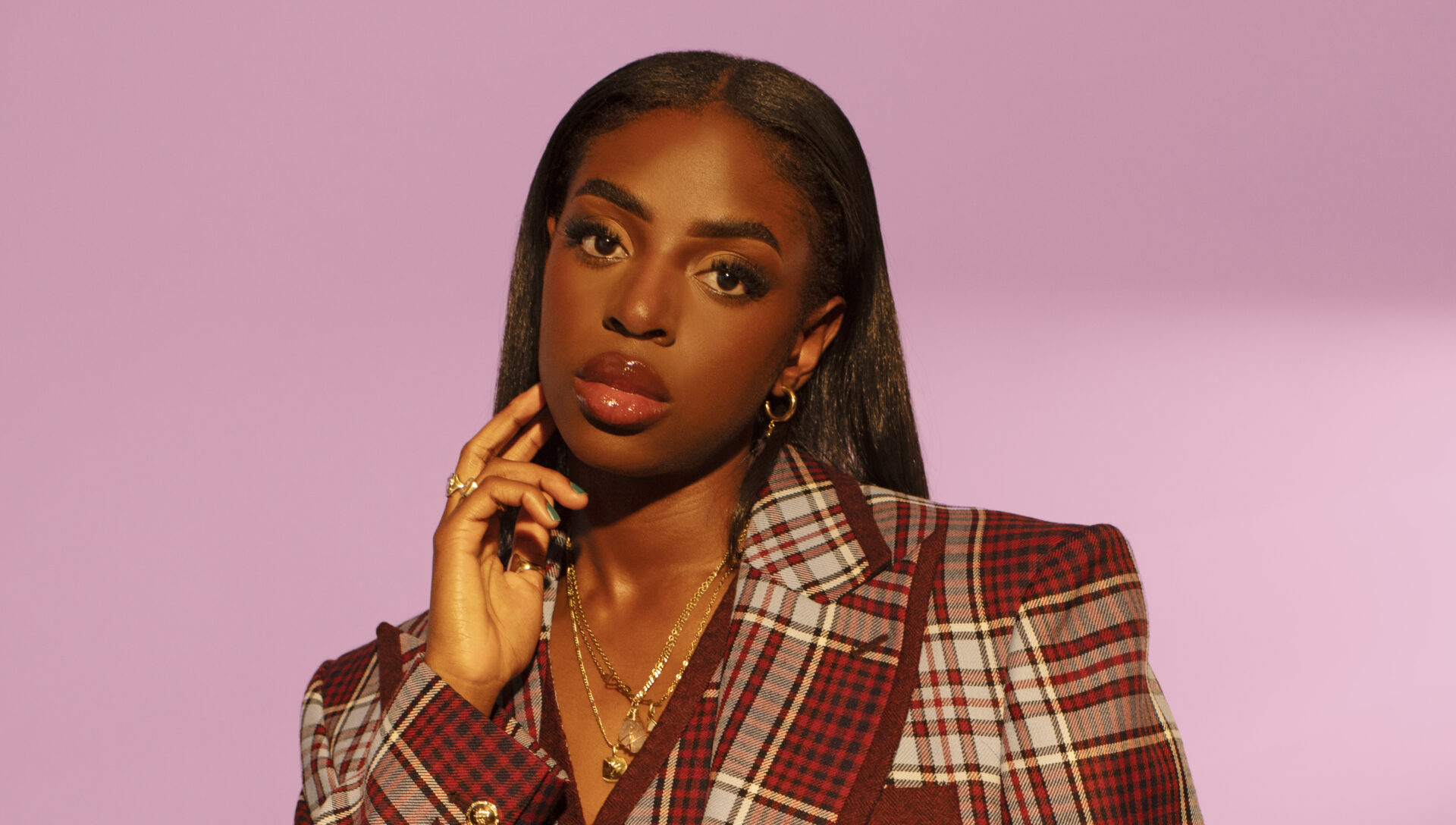
If there was ever a poster girl for the positive side of social media, it has to be Cat Burns, this year’s winner of the Music Award, supported by Jaguar. TikTok played an essential role in the 22-year-old south London singer’s rise to fame when, two years after its initial release, her track ‘Go’ reached number two on the UK singles charts this summer, selling more than 600,000 copies. (“No, I haven’t heard from Mr Styles,” she laughs as she names the pop star who kept her off the number-one spot. “I’ll be awaiting my call!”) Not only that, but social media’s mysterious, unknowable algorithms also had a very personal impact on Cat: they helped her to come out.
“It was the beginning of lockdown, and I was on TikTok, which liked to do a thing back then where it would… tell you you’re gay,” the star explains, half-joking. “It would show random videos, and if you interact with it, they’re like, ‘Oh — it seems like you like this stuff…’ I got fed a lot of videos and was like, ‘This makes sense.’”
The Brit School graduate, who identifies as a “woman loving women” and goes by she/her pronouns, then came out to her family. “Coming in my mum’s room, showing her different videos of people coming out, seeing what her response was.” Which was? “‘That’s so cute!’ Then, like, ‘Why do you keep showing me these? Have you got something to tell me?’ I was like, ‘I don’t think I’m straight.’ She was like: ‘OK.’ A couple of weeks later, [she] asked me a million questions. Then that was it. As easy as that. I told my sister, and she was like, ‘What sort of girls do you like, then?’”
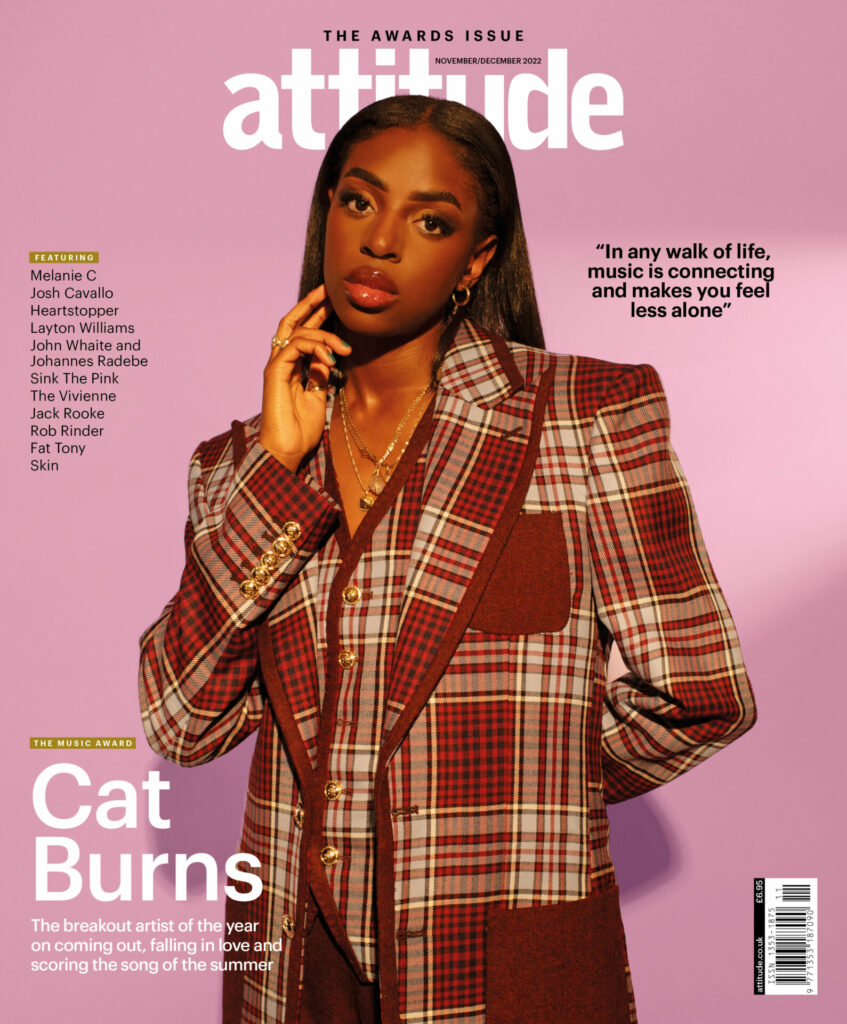
It’s an entirely positive coming-out story that will doubtless please her LGBTQ+ teen fans, and the rest of her 5,276,134 (and counting) monthly Spotify listeners. But as songs like ‘Anxiety’ (“What if I let them see me in a beanie / And a white tee, and oversized jeans / Would they recognise me /Without my anxiety?”) and debut EP Emotionally Unavailable make abundantly clear, Cat’s journey has not been without hardship.
Here, ahead of the release of new singles ‘People Pleaser’ and ‘Sleep At Night’, Cat revisits the highs and lows of her formative years, from being targeted with homophobic racism online to falling in love and how that turbocharged her creativity.
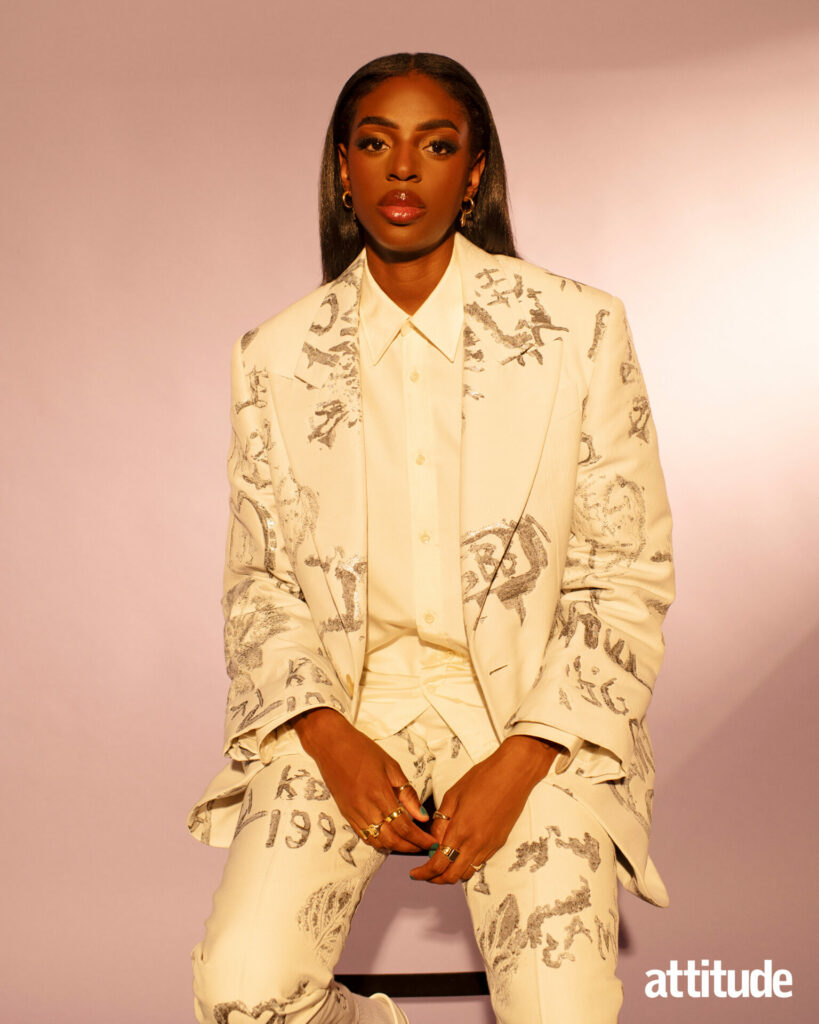
Did you know ‘Go’ was going to blow up?
Not at all. I thought, ‘Oh, this is nice.’ I wrote it when I was 18 and teased it two years later. I never thought it would be what it is.
There’s a simplicity to it. You don’t see the effect coming. ‘People Pleaser’ has the same quality. You have a formula you’ve perfected.
Yay! Thank you. I try my best.
Have you interacted with the person you’re addressing in ‘Go’ since?
No, because ‘Go’ is about my friend who was cheated on — my guitarist at the time. He told me the story; I thought it was quite dramatic. ‘I could make a song out of this. How would I react if this happened to me?’ Which is why it feels so personal. ‘OK. That’s the end.’
When writing from a personal place, who are your muses?
My partner’s one of my main muses. I’ve written many a love song since being with her. She’s always, like, ‘When are the love songs coming out?!’ In good time! Plus, my family, friends, career, and life. People I experience. As long as I’m living, I have things to write about.
You’ve said you want to help queer Black people tell their stories. Whose stories inspired you, growing up?
My realisation of my sexuality was later — I was 19, 20. So, growing up, I didn’t really have any particular icons I sought out. If there was a TV character that was part of the community, I saw that as ‘I just really relate to and identify with them.’ My 22-year-old self, now, can say: “I was them, basically.” [For example, on] Pretty Little Liars, [there’s] a character called Emily [played by Shay Mitchell], and her love interest. I’d watch clips of them outside of the show. I did the same with any TV show that had queer relationships. I’d fixate on it but didn’t know why.
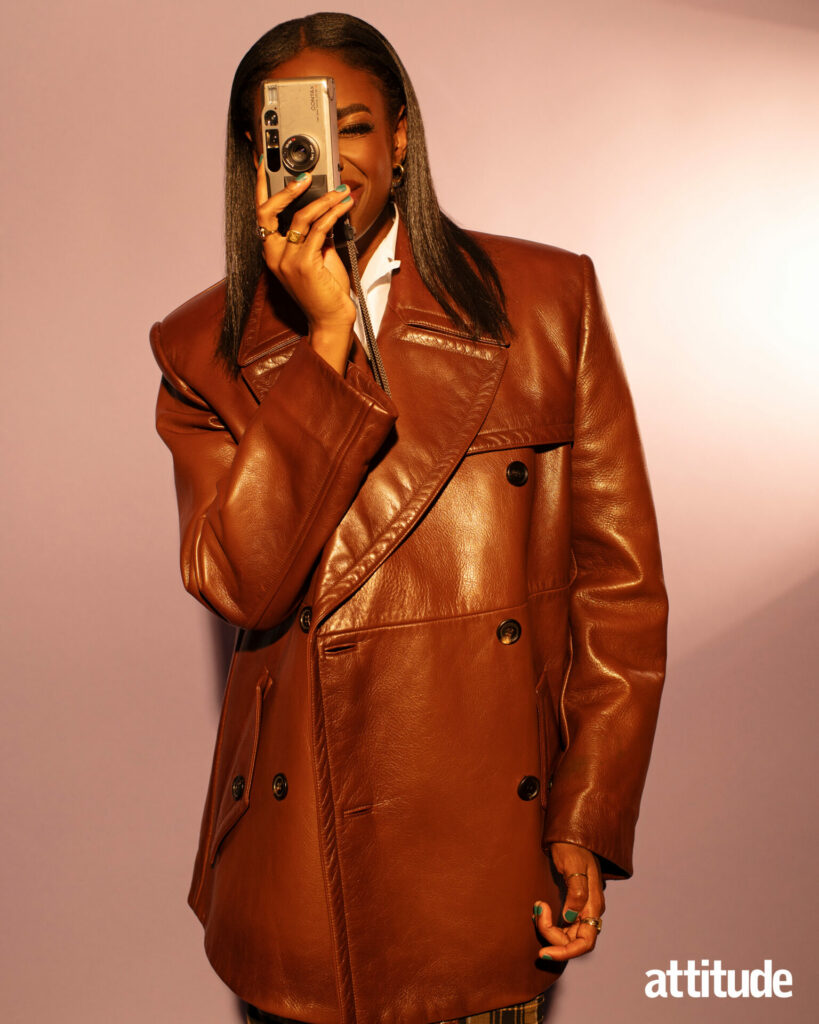
The EP Emotionally Unavailable was named in 2020. Does that descriptor still apply?
No. I’m definitely emotionally available now. I’m a lot more open to being vulnerable and letting people in. Open to love in all realms. Obviously, I’ve got romantic love and friendship. It was where I was in my life. But as I’ve got older, therapy, journalling, and things [have] helped me.
You’re an old soul for 22!
Thank you. I get that a lot!
What’s ‘People Pleaser’ about?
Why are some people people-pleasers? Usually, it’s to do with their childhoods, not being shown that their needs, wants and comfortability is important. So, they consistently put themselves behind other people. Whatever other people want, they’ll do. I definitely am still a people-pleaser. I struggle with confrontation, saying my needs and wants, in case the reaction’s not good. And if it’s not, I backtrack. One of the lyrics is: “I hate being this way”. I wish I could change it. I’m working on it every day.
The song ‘Anxiety’ — could you elaborate on its theme?
It’s about struggling with anxiety and that internal battle when part of you wants to go and do things, but there’s the other part that’s a risk assessor. ‘This doesn’t feel that safe, so maybe we won’t.’ But to an extreme. Where it’s now crippling you and not allowing you to be your true and full self. You’d love to go to that party but can’t because you’re anxious about a random scenario that could actually never happen. It’s about asking yourself to be in control and in the driver’s seat, rather than the passenger seat.
Given your experiences, and the role platforms like TikTok play in your career, what’s your advice for someone whose relationship with social media is affecting their mental health?
Take breaks, for a good length of time. I used to use Snapchat loads when I was younger. Then I realised, ‘This is not for me — I can’t be on it the amount I’m on it.’ And watching other people do things and going, ‘I’m not doing anything.’ I just deleted it and have never had the same relationship with it since. If it’s linked to your work, put things in place so you don’t have to be on it and scrolling. Do what you need to do and come off it if it really is affecting you, how you view yourself, and your mental state.
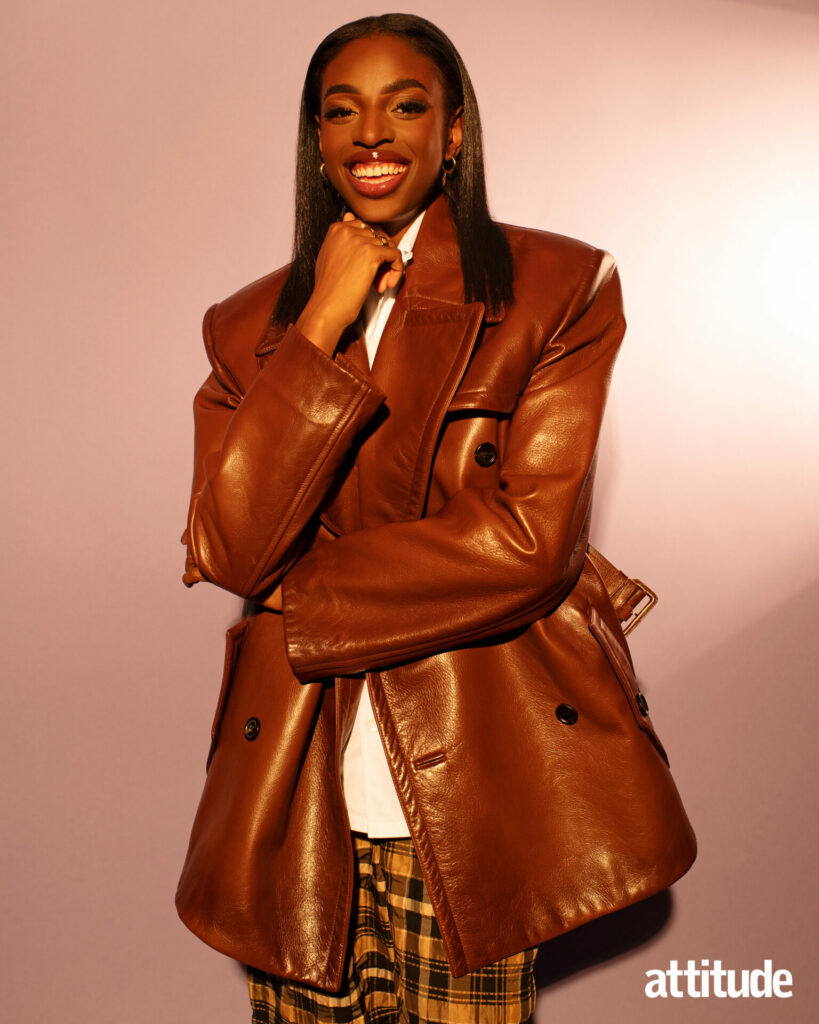
That said, your coming-out story is an interesting example of how social media can be a force for good.
Oh, 100 percent. During lockdown, there was a massive spike in people coming out. A lot of people would say TikTok’s the main reason they came to that realisation. The amount of people living their truth; videos of people coming out. I identified to the point of: ‘This is no longer allyship — you are part of the community.’ I realised I wasn’t straight and thought I could have been sapiosexual; being attracted to the mind in whatever form that person comes in. But after checking in with myself, I realised it was women.
There’s a perception that when people find success, or ‘make it’, they no longer experience prejudice, racism, or microaggressions. What would your response be to that assumption?
I think it’s all dependent on where you go. To a particular level that’s true, because class and financial status are introduced into the equation, so the spaces you’re going into, people might be more aware of your financial situation. You might not be in spaces where prejudice might hit you. But then, on the flip side, your financial situation can also lead you into spaces where people are going to make assumptions of you or wonder how you’ve got to where you are. And there are parts of the world where people might not know who you are, and all that goes out of the window, and you’re still Black. I think that’s something I’ve learned. You can be doing whatever, the best thing in the world, but you can go to another place and they just see you as a Black person. And they don’t really like you.
What’s your message to someone who wants to be a better ally to Black people, and LGBTQ+ Black people, and people of colour?
Listen to actually understand, not to respond. Continue to make spaces safe for Black people and queer Black people to share their stories and joy. There aren’t many spaces in London I can think of — events — that they can go to and have joy. There’s not a set place. People have to start their own thing.
What would you say to someone wanting to escape from external, societal pressures over how they dress and present?
Steer away from it, don’t do it. Deep down, you know what you like, what you’re drawn to. My friend who studies fashion says: “Dress to your personality — that never goes out of style.”
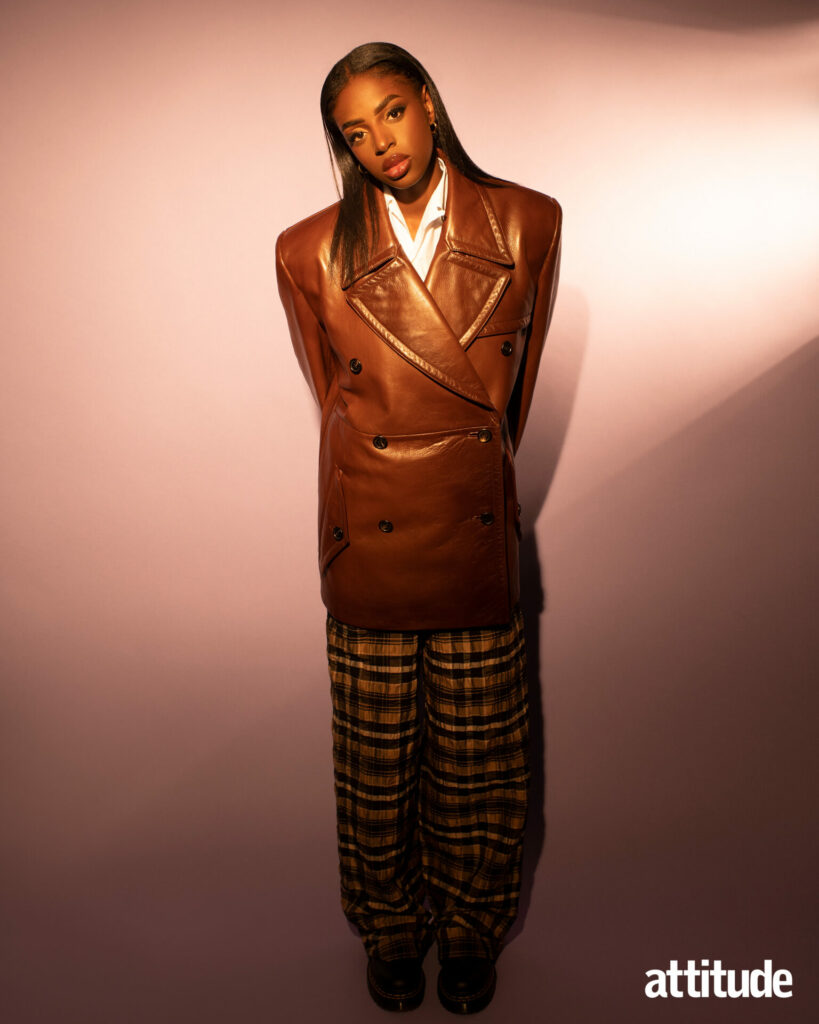
What does that mean to you? What do you feel most yourself in?
I’ve always been attached to Jamaican rude-boy fashion. Sweater vests, flat caps, trousers, loafers, lace-up shoes. Ever since I was young, I loved my granddad’s style.
Have you stolen any of his clothes?
Some. I’ll steal some more! I’ve always loved menswear but couldn’t pinpoint exactly what it was. As I got older, I was like, “It’s contemporary menswear.” Really clean, simple. You look like you smell nice! It was my girlfriend who was like, “You seem to like Jamaican rude boy. You should do some research.” I was like, “That’s exactly my style! That’s so weird!”
What’s her style?
Menswear and elements of womenswear. It’s our energies. It depends how we feel. Some days, I have a more masculine energy that I want to reflect in what I’m wearing. [But] I think I generally have a feminine energy. So even when I wear masculine clothes, I still exude a level of femininity. And then sometimes I feel more feminine, but won’t necessarily dress feminine, but I’ll do more makeup that day, or do something else that’ll make me feel ‘pretty’, per se.
That variability — was that apparent from a younger age, despite not coming out until 19?
Yeah. How I dressed and presented was more masculine when I was a young teen. Then I got caught up with school, being boy-crazy and going into a hyper-feminine phase. Especially on nights out. Which was not me, at all! I was definitely dressing for what society thought I needed to look like. Especially as Black women, where we’re already masculinised by society anyway. I was like, ‘Right, I’m going to steer right away from that, and dress femme, so no one can ever doubt my femininity.’ It wasn’t until lockdown that I was like, ‘Actually, I don’t care.’
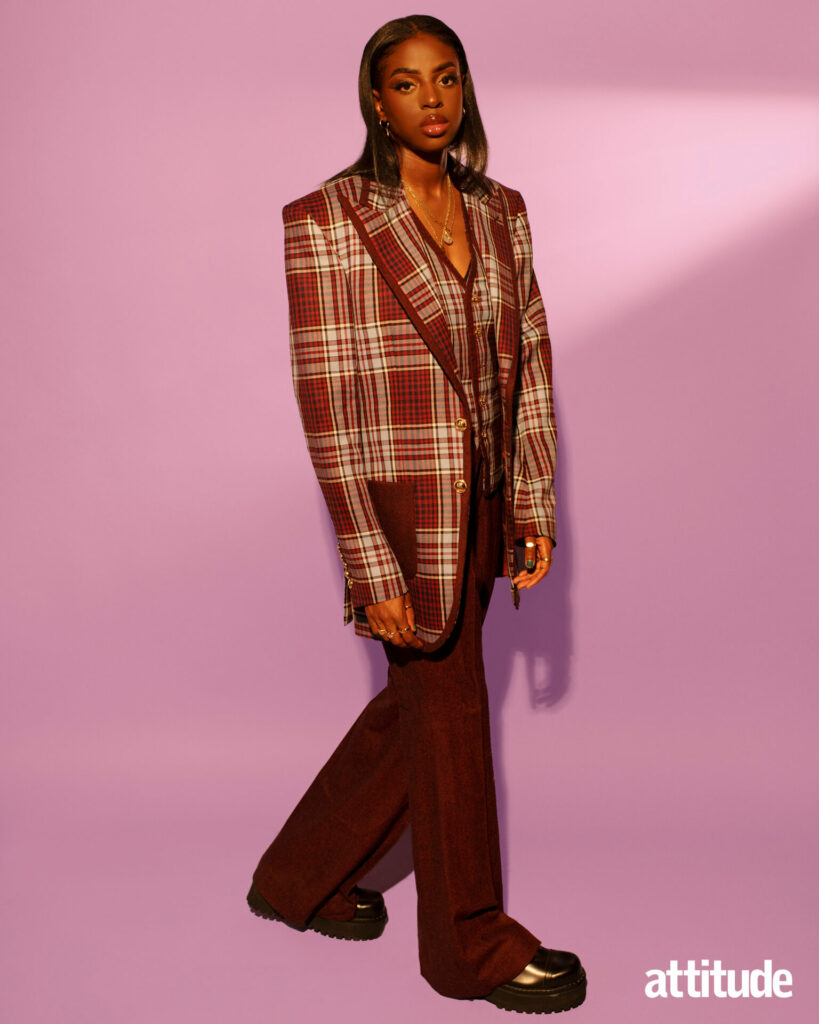
When you were dressing in a masculine-presenting way when you were younger, did you get negative feedback? And is that different from homophobia?
I got misgendered a bit. That upset me. At a young age, I didn’t really know what that meant. It happened recently: last year, people kept commenting on particular posts and purposely misgendering me. I thought: ‘There’s racism linked in here.’ I went on a deep dive online and saw how masculinisation of Black women is linked to racism, and why that is. I read articles about the experiences of other tall, dark-skinned Black women also being misgendered all the time. I felt less alone and realised, ‘This is under the umbrella of racism.’
You cut your teeth as a busker. Do you think that gives you an edge on your peers?
Busking’s a humbling experience because you’re performing to people who didn’t ask you to. On top of that, asking for money as you sing — it’s a lot of audacity! Anything can happen — drunk people lying down in front of you! — and it teaches you to keep going.
Do you miss it?
Yeah. I don’t know. No. I love the idea of people watching and going, ‘What’s she going to do?’ Then I’d start singing, and people would immediately stop, a crowd would form, because they love music and what it was I was singing enough to take out their phone and film. I loved that. But I didn’t do it for fun, I did it because it was my job. I needed to earn money. There was a bit of a pressure on the hours I sang.
Was it something you and Ed Sheeran bonded over?
I told him people from all walks of life love him. I remember busking and singing ‘The A-Team’; a homeless man came and sat next to my mum and said: “This song is for us!” That was so touching. Any walk of life, any financial circumstances, music is connecting and makes you feel less alone. [Ed] was like: “Wow.”
What’s the best piece of advice Sam Smith gave you after you collaborated with them?
Prioritise mental health. Put boundaries in place. Say no. Don’t overwork or overexert yourself; it can bite you in the bum. I think they were doing loads and lost their voice and couldn’t do anything for three months. And being annoyed with everyone around them: ‘Why did you work me so hard?! Now I have no voice!’
‘People Pleaser’ and ‘Sleep At Night’ are out now
Check out Cat Burns’ acceptance speech from the 2022 Virgin Atlantic Attitude Awards below:
Photography Jack Alexander Fashion Joseph Kocharian Makeup Daniela Monteiro Fashion Assistant Bethan Dadson
The Attitude Awards issue is out now
